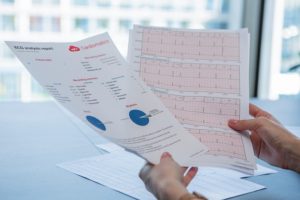 Based in the USA, Weill Cornell Medicine has initiated a new clinical project together with the Mwanza International Trials Unit located in the Lake Zone of Tanzania with the aim of exploring the burden of cardiac arrythmias in adults with and without human immunodeficiency virus (HIV). The data collected from 24 hours of ambulatory cardiac monitoring will be evaluated by Cardiomatics, an artificial intelligence (AI)-based cloud technology for electrocardiogram (ECG) data analysis.
Based in the USA, Weill Cornell Medicine has initiated a new clinical project together with the Mwanza International Trials Unit located in the Lake Zone of Tanzania with the aim of exploring the burden of cardiac arrythmias in adults with and without human immunodeficiency virus (HIV). The data collected from 24 hours of ambulatory cardiac monitoring will be evaluated by Cardiomatics, an artificial intelligence (AI)-based cloud technology for electrocardiogram (ECG) data analysis.
The aim of the research is to screen for cardiac arrythmias in a mixed cohort of 1,000 people living with and without HIV in north-western Tanzania. Participants will undergo 24 hours of ambulatory cardiac monitoring, after which, the collected data will be sent to the cloud and analysed for cardiac arrythmias, including supraventricular, ventricular arrhythmia, and heart rate variability (HRV) parameters, using state-of-the-art algorithms provided by Cardiomatics.
Harnessing algorithms to screen HIV patients with cardiac arrythmias
Cardiomatics is an online SaaS platform, created by experts with experience in developing AI and machine learning. The effectiveness of Cardiomatics algorithms has been validated by cardiologists in various clinical trials across Europe, including the University of Basel, the University of Copenhagen, and the Medical University of Warsaw. The software is used by hundreds of cardiologists and practitioners from over 15 countries around the world, including Germany, Switzerland, and the United Kingdom. Based on algorithms trained on billions of real patients’ heartbeats, the software enables fast and accurate detection and analysis of many components of the ECG signal.
“We were delighted to partner with Cardiomatics for our ongoing research in Tanzania. Cardiomatics offered us timely information and customer service, and the opportunity to generate customisable reports from the data that we are collecting. Their online interface is incredibly user-friendly and works seamlessly with the CamNtech Actiheart devices we are using to collect data,” said Cody Cichowitz (Weill Cornell Medicine, New York City, USA).
The Cardiomatics software can analyse ECG signals recorded in various data formats and is compatible with over 25 commonly used devices, providing ECG reports that are accessible at any time on desktop or smartphone. Physicians can also connect the diagnostic device to any computer and send ECG signals to the cloud. There, the signals are analysed by AI algorithms, reducing analysis time by up to 80% compared to the standard procedure.
Commenting on the practical application of the Cardiomatics platform, Cichowitz continues: “[The platform] allows our team to upload samples with just a few simple steps and receive a reliable report about individual patients. Cardiomatics also exports our data in bulk, enabling us quickly move from data collection to analysis. This helps us respond to individual patients’ conditions but also rapidly advance our research aims.”
Making an impact
As patients with HIV are living longer, there is an urgent public health need to characterise and mitigate the risk of cardiovascular disease, including cardiac arrythmias. The implementation of AI algorithms in a clinical trial can significantly accelerate the compound examination of the association between HIV and heart rhythm disorders, and thus support public health efforts in reducing the burden of cardiovascular diseases in East Africa.
“We are proud that our achievements in the clinical field and recommendations of cardiologists from all over Europe have enabled us to gain the trust of scientists from the USA. We are excited to see how our algorithms are contributing to clinical research in the US market,” said Rafał Samborski, Cardiomatics CEO.
In a new clinical project conducted by Weill Cornell Medicine, participants with diagnosed arrhythmia will be referred to a local cardiology clinic and treated according to the Tanzanian National Guidelines. The project will provide novel data about the burden of arrhythmia in adults living with and without HIV in north-western Tanzania.
“Starting this project is a significant step for the clinical team, and it is an honour for me to lead it. A cohort study of patients for HIV, sleep, nocturnal hypertension, and cardiovascular disease in Tanzania will allow us to look for correlations between arrhythmias and HIV, from which a large group of people in sub-Saharan Africa suffer. The results of this study could have important implications for cardiac care in this part of the world,” emphasised Nikola Fajkis-Zajączkowska, clinical project manager at Cardiomatics.









